Equity News Magazine
Equity News is the official magazine of Actors' Equity Association. Equity News has been around in a variety of formats since 1915.
Telling Stories When They’re Needed Most: Equity Members on Their Work Today
Paul Robeson once said, "Through my singing and acting and speaking, I want to make freedom ring. Maybe I can touch people's hearts better than their minds, with the common struggle of the common man."
At this time in the United States, telling human stories onstage may feel extra important, or fraught, or polarizing or heightened in any other number of ways. Equity News spoke to members working on productions around the country about the importance of telling stories, what their show's themes brought up for them and making art in a time of political upheaval.
Cincinnati, Ohio: English
English, by Sanaz Toossi, won the 2023 Pulitzer Prize for Drama and had a Broadway run earlier this year. It is set in a classroom in Karaj, Iran, where a group of adults are studying for the international Test of English as a Foreign Language, a mark of proficiency that may be crucial for those who wish to study or work abroad. A new production ran last month at Cincinnati Playhouse in the Park.
"It's an intimate play. It's deceptively simple," said Equity member Leyla Modirzadeh, who plays Roya, a student in the class. "It's subtle but there's all these relationships."
No one needs to remind the company members of English that immigration is a fraught topic in the United States these days. But what spoke to them all is that the Iranian characters imbue the play with specificity without coming at the expense of telling a deeply human story.
"I hate when plays are serving a purpose to educate people about an exotic culture," said Modirzadeh. "That reduces the art to something smaller than it is."
Multiple company members reflected on how performing in a non-political piece about an underrepresented group can feel inherently political.
"This piece feels so important because it isn't asking you about politics – it is asking you about yourself, and what assimilation means to you," said Brooke Redler, the show's stage manager. "This is a good reminder that we are stronger when surrounded by people of mixed backgrounds, not homogenized."
"It's a very humanizing play," said Modirzadeh, who has now been in two separate productions of English. "That's where disrespect comes from: when we dehumanize people."
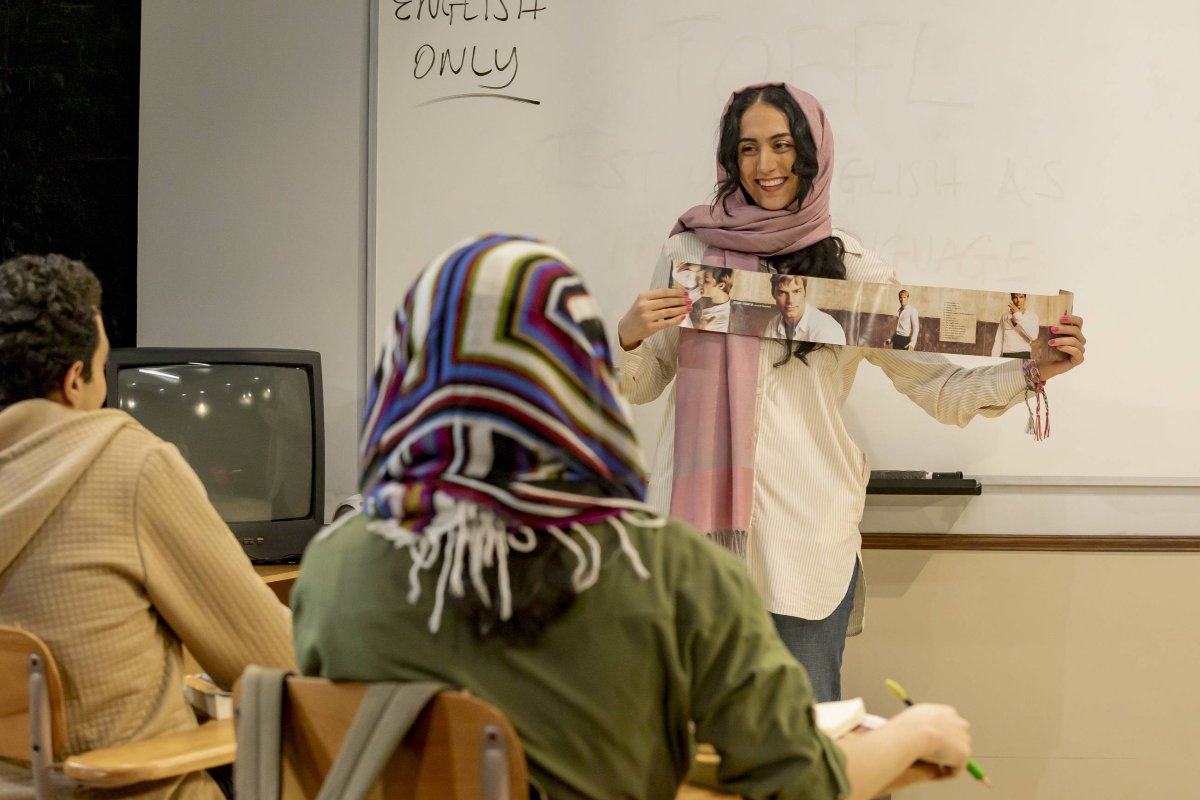
Equity member Aryana Asefirad (standing), Equity member Fady Demian (left) and Sanam Laila Hashemi in English at Cincinnati Playhouse in the Park. Photo by Mikki Schaffner.
Cincinnati does not have a large Persian population, although the local community has embraced this production; the run coincided with Persian New Year, Nowruz, and local Persian residents set up a traditional holiday table in the theater. And many audience members regardless of background have shared not only how much they have learned about Iran, but how they have reconsidered the dominance of English globally, how the friction of assimilation can transform lives.
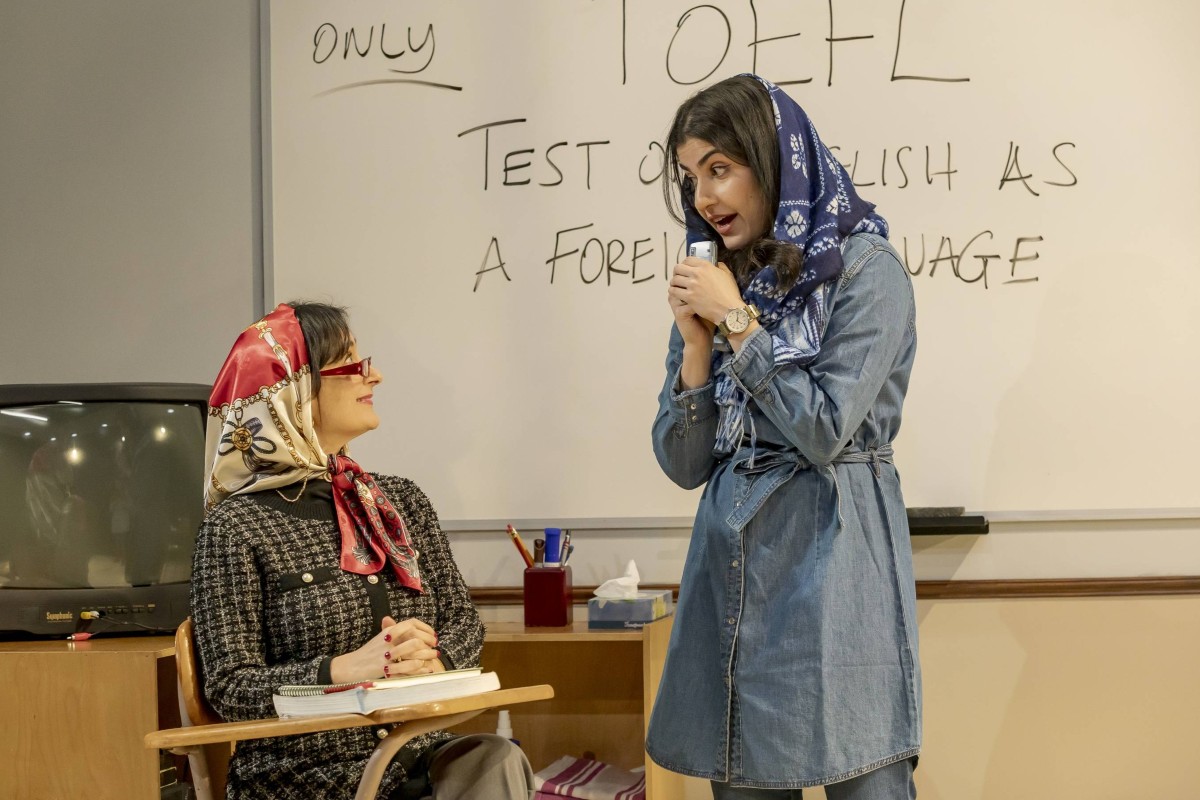
Equity member Leyla Modirzadeh (left) and Sanam Laila Hashemi in English. Photo by Mikki Schaffner.
English is not a play designed to address American immigration policy or its relationship with the Middle East. But to these Equity members working in the middle of the country, this production's emphasis on empathy is significant in its own way.
"I like to think that plays like English do make a difference, especially for audience members who aren't used to seeing underrepresented groups onstage or on screen," said Shelby Scaffidi, the show's second stage manager. "It's so important to see and hear stories that are completely different from your own lived experience, because that's how we become better, more empathetic people."
As for the question of if that act of engendering empathy can be a political act, one Equity member offered a resounding yes:
"Making art is the most constructive thing I can do," said Neagheen Homaifar, who plays Marjan, the class's teacher. "Every night, I breathe life into a woman who is, on the surface, completely different than our audience. They see her and think they have very little in common with her, and it's my belief that very quickly, people start seeing less and feeling more.
"Art gives us the opportunity to witness a story – a struggle, joy, aspiration, complexity. We temporarily step outside ourselves only to find that we've come right back around, feeling something in ourselves, a reaction of some kind. For me, making a difference is having people recognize themselves in others. It's a small act of resistance against forces that would have us believe we're fundamentally separate, when our shared humanity runs far deeper than our differences."
Read more: Equity actor Fady Demian offered further reflections on his work on English and what it means to him as an immigrant, and in this moment.
Pasadena, California: Frou-Frou: A Menagerie of Sorts
Boston Court Pasadena just closed the world premiere of Frou-Frou: A Menagerie of Sorts by John Anthony Loffredo. This reimagining of Tennessee Williams's The Glass Menagerie makes both siblings explicitly queer, as one comes to understand his sexuality and the other their gender.
As with English, Frou-Frou is a play not about politics on the surface, but it speaks to experiences – specifically queer ones – currently threatened because of the political environment of the United States.
"Revolution and political action are baked into this piece," said Patrick Reilly, who plays Harold, a new take on Tom Wingfield. But like the performers in English, the show as a piece of resistance cannot come at the expense of telling a human story. "I think it's a beautiful element to remember, but it's really not my main focus," he said.
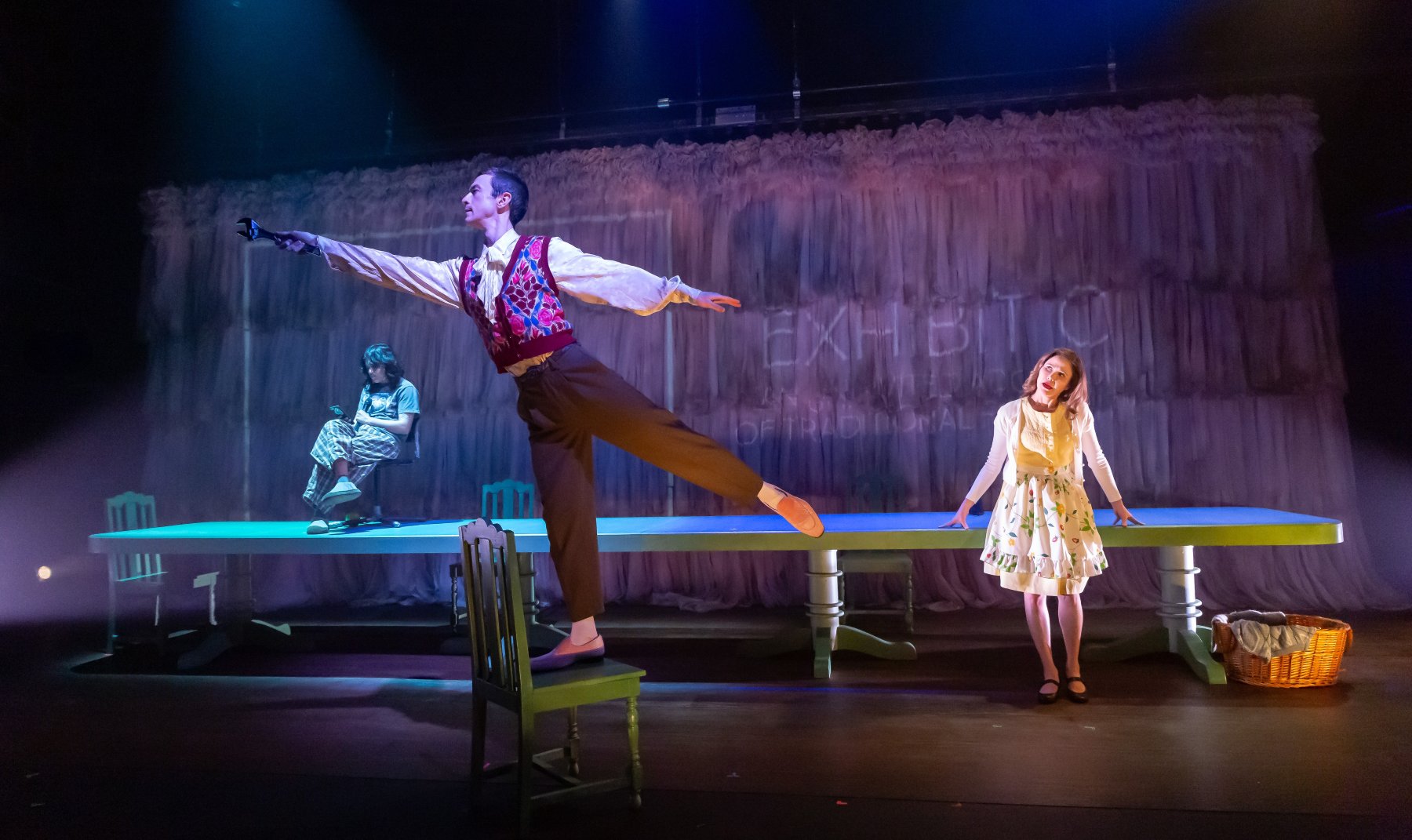
From left, Simone Brazzini, Equity member Patrick Reilly and Equity member Reiko Aylesworth in Frou-Frou: A Menagerie of Sorts at Boston Court Pasadena. Photo by Brian Hashimoto.
"Queerness and transness have been politicized for so long that I didn't immediately connect [being cast] to the news," said Simone Brazzini, who sees Equity membership in their future and plays L, a non-binary take on Laura Wingfield. "My first thoughts were more of gratitude and excitement to get to play a non-binary character that closely resembled who I was a few years ago. As the rehearsal process went on and the current president took office, I did begin to connect it to the news as anti-trans legislation became even more prevalent and abhorrent. It felt strange to have such privilege to express myself authentically in this play as well as live in a liberal bubble here in L.A. when much of the country and world are forced to hide who they are due to safety."
Once again, above all, the humanity of these characters motivated the cast.
"What queer people know is we have the capacity to be just as bad as straight people, just as flawed, as desperate, as sad, as angry," said Reilly. "Harold is so proudly flawed, and to me that is more interesting to explore because I feel that does more unifying with all people than we are constantly focused on what we are fighting against or pushing against."
The cast of Frou-Frou considered: who should see this piece? Brazzini, for one, hopes feels that the play has a lot to say to queer audiences.
"My ending speech is one of my favorite moments because it really is a call to action to form community, face those fears together, and live your best life," they said. "I do believe in the power of art to transform lives and make a difference. It's why I focus my life on acting, storytelling and filmmaking. Community and connection are very important reasons as to why I create."
Reiko Aylesworth, who plays Mother, believes audiences can experience the piece through an additional lens: intergenerational trauma in times of change.
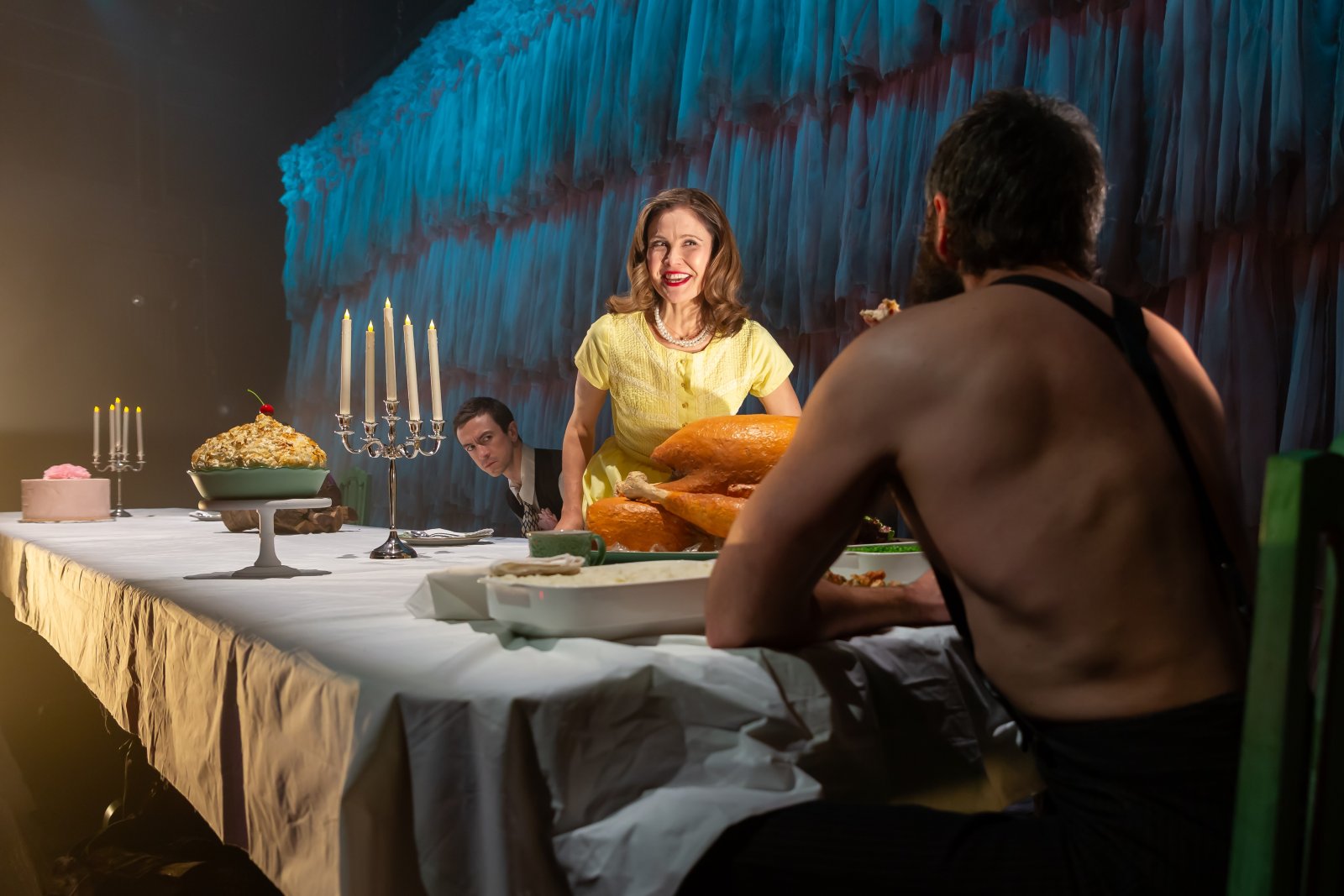
From left, Equity members Patrick Reilly, Reiko Aylesworth and Ryan Imhoff in Frou-Frou: A Menagerie of Sorts. Photo by Brian Hashimoto.
"In Frou-Frou, our characters inhabit completely different eras and geographical locations, as we strain to communicate, connect or control each other. The playwright spoke of feeling this way with his own family and I think many of us can relate. Mother occupies the world deep South in the 1950s. The home where she's raised her children is about to be stripped away. She speaks of 'the horrors that await us on the other side of that door'. In her world, suppressing or hiding one's gender identity or sexuality is a matter of survival." Aylesworth said, drawing on her own family’s experiences of losing relatives in the Holocaust on one side, and surviving a Japanese internment camp on the other. “I hope you see my character’s behavior is inexcusable, but it’s also understandable, and I hope recognizable.”
For the cast of Frou-Frou, a deeply human story in the face of dehumanizing times can provide audiences with what they need to move forward, be it comfort, courage or inspiration.
“The impact is indirect. We can't control how the audience ultimately interprets our play. That’s the difference between propaganda and art,” said Aylesworth. “My goal with anything I’m part of is that we help people feel less alone in the world, so they might take even small actions toward change. Hopefully, all of our audiences can see their own universal stories (leaving home, falling in love, severing toxic relationships...) through the lens and specific stories of marginalized people. That’s not an easy task, so we have to bring ourselves and humanity and history and vulnerability and risk."
"Those shameful bastards in power want us to feel powerless," said Ryan Imhoff, who plays "Man," the show's analog to the Gentleman Caller. "Telling stories, and receiving them, is a way of surviving… We must do what we can. For me, it's working as hard as I can to honor this particular story. Frou-Frou has a beauty and power to it that can make an audience member feel a little less alone. But it also has the fierceness to challenge someone who may be stuck in outdated modes of thinking, who may have been swayed by fear, away from love and towards hate, and I believe it has the capacity to change that person's heart."
New York City: Amerikin
Primary Stages is currently presenting a production of Chisa Hutchinson's Amerikin Off-Broadway. This dark comedy portrays a Southern man who joins a local white supremacist group for social advancement – only to learn from a DNA test that he has some African ancestry. A Black journalist and his aspiring reporter daughter get wind of the story and pay him a visit to investigate, bringing up difficult questions for everybody about race, belonging and the legacy of division in America.
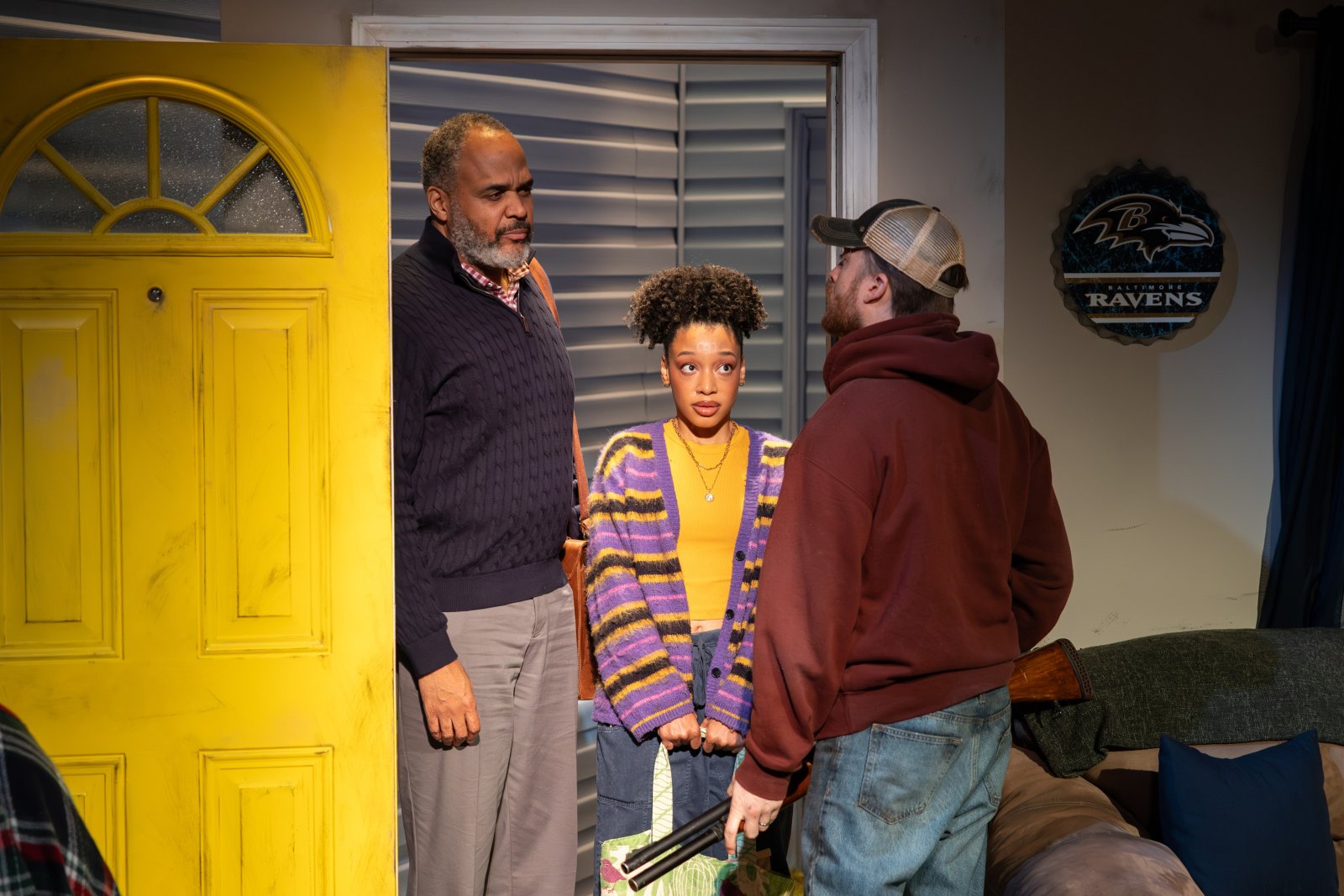
From left, Equity members Amber Reauchean Williams, Victor Williams and Daniel Abeles in Amerikin at Primary Stages. Photo by Justin Swader.
"The really tragic part about this play is how it's been in development since 2017 [when the show also takes place], and we've circled right back to the same presidency," said Brillian Qi-Bell, the production's stage manager.
"This is the first script I've read that dealt with white supremacy head on, in this particular way," said Andrea Syglowski, who plays Alma, the catalyst for the story reaching the journalist characters. "My family is both Black and white, and I had been feeling such disappointment in the current American climate, particularly in the current administration, and I felt compelled to tackle it in my work. I still do."
Amerikin asks audiences to look white supremacy in the face, balancing highlighting the absurdity of racism while making its characters three-dimensional. The show may be a vehicle for empathy, but in ways that ask the audience to reckon with their own biases.
"I am mixed Chinese, white and Black," said Qi-Bell. "Sometimes your ethnic culture is a wonderful thing that helps you connect with other people and feel a shared pride in your history. And sometimes, you wonder if it really means anything if that's not how you are immediately perceived… As people, we do just want to belong with each other… Basing your sense of self on your ethnic background definitely can give you an identity crisis when you don't fit into all the boxes that are stereotyped for you."
Asking questions about race and belonging at a time that white supremacy and division are gaining a foothold in government makes for an electric production, and the company has been energized by a diversity of responses.
"Some audience members make it a point to tell me how timely – ever timely – this play is," said Daniel Abeles, who plays Jeff, the would-be white supremacist. "Some are just irritated by it. The student shows are wild. They're so vocal and reactive. And some audiences are much quieter. It varies so much but I think it's because folks are really listening. The plot really zig-zags so they've got to lean in. And Chisa is demanding us to sit in the discomfort. You can't just change the channel."
But Abeles also considered how typical theatergoing audiences may be in a political bubble where the play's impact could be different.

Equity stage manager Brillian Qi-Bell. Photo by Wren Stone.
"I do think making theatre is important and constructive… if people see it – especially those that normally might not," he said. "That's always been the catch, though. Often, we're playing to the people who regularly see shows… Outreach is integral to expanding the conversation. It is so amazing to talk with people who haven't been to a lot of theatre... Amerikin is trying to bridge some cultural gaps – with humor, empathy, violence and some pretty direct messaging. I hope some new folks see it."
Still, all across the country, Equity members feel their work touching others in real time, from educating audiences about the world beyond the one they know, to creating a sense of community to being a voice of dissent at a time when dissent may be increasingly dangerous.
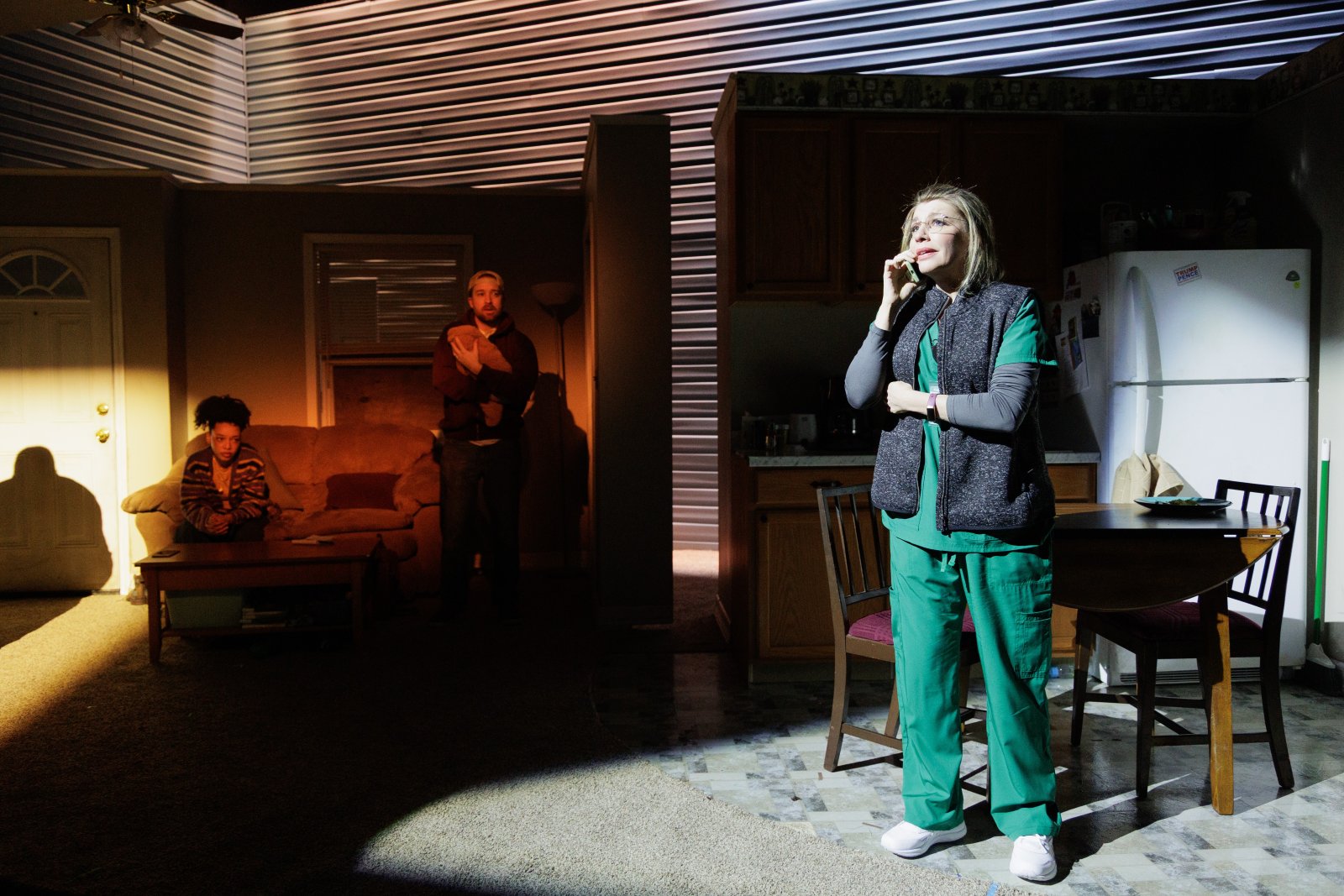
From left, Equity members Amber Reauchean Williams, Daniel Abeles and Andrea Syglowski in Amerikin. Photo by James Leynse.
"Art and culture are among the first things oppressive governments seek to silence. That hasn't changed," said Syglowski. "It's become more and more difficult to continue to work in the theatre, and that is all the more reason to keep attempting to do it. I do believe with all my heart that theatre is a sanctuary for healing. We can take a crack at what we see through the guise of narrative, ‘fictional' story-telling, sit in a room as a community, and listen. Listen. Listening. That's something we can all attempt to improve."
Banner image: (left to right) Equity member Neagheen Homaifar, Equity member Leyla Modirzadeh, Equity member Fady Demian, Equity member Aryana Asefirad and Sanam Laila Hashemi in English at Cincinnati Playhouse in the Park. Photo by Mikki Schaffner.

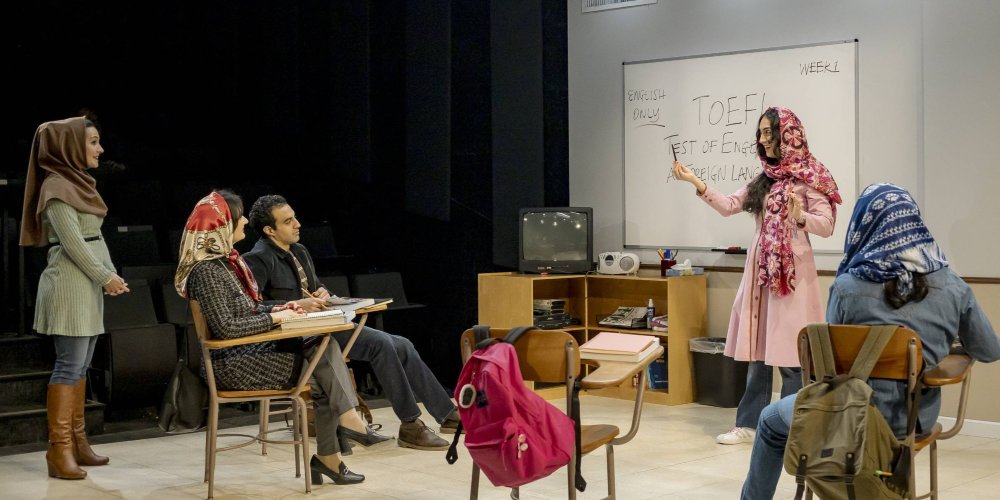
Leave a commentOrder by
Newest on top Oldest on top